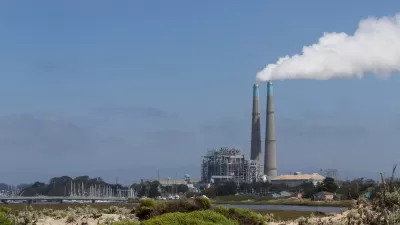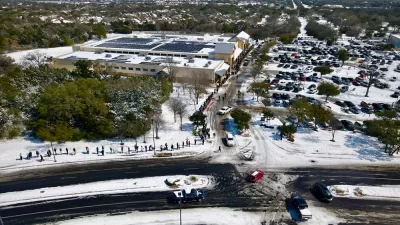Nations have sunk billions of dollars into carbon capture and storage for coal plants and have little to show for it. A new natural gas demonstration plant outside Houston is confident it is up to the task — without using federal grants.

In this "All Things Considered" radio report, science correspondent Christopher Joyce visits the NET Power plant natural gas power plant, still under construction, and speaks with the chief executive officer, Bill Brown. "[W]e'll be the first technology that takes fossil fuels and cleans up the carbon at no extra cost," claimed Brown. [An audio version is accessible in the article].
Applying carbon capture technology to coal plants has a long track record of canceled and "on hold" projects, not just in the United States, but in Canada and Europe as well, according to the Carbon Capture and Sequestration Technologies program at MIT, which stopped compiling data last September. The Petra Nova project, also outside Houston, may be the exception. More on that later.
Private funding is backing the new technology that will power the 50-megawatt demonstration plant in La Porte, Texas.
The engineering firm CB&I, and power company Exelon are partners. So is Toshiba. Toshiba's contribution is the turbine.
Most turbines make electricity when you force high-pressure steam through them. But Brown's turbine doesn't use steam. The plant burns natural gas to make high-pressure carbon dioxide — and uses that CO2 to drive the turbine.
Support from environmental groups?
Some environmentalists are excited by the technology. "From our point of view, we're talking about climate protection," said George Peridas, an engineer at the Natural Resources Defense Council, one of several environmental advocacy groups that support carbon capture research. "From the standpoint of the fossil fuel producers, I think they are looking at the bottom line. They are looking at survival; they are looking at creating new jobs."
Competition from renewables?
Right now, renewable energy is growing faster than any other source of energy, said Jonathan Levy, an energy investment analyst at Vision Ridge Partners.
"With the cost of wind and solar where they are, and continuing to decline," he told me, "it's hard to see why you'd go all in on a big fossil project that is more expensive than the other technologies."
The aforementioned Petra Nova project is included in a full-length feature article on CCS technology by Brad Plumer of Vox. Notwithstanding the miserable track record of most CCS plants, the technology "is garnering a surprising amount of support in Congress right now, with Democrats and Republicans working together to craft a pair of tax and finance bills that could help carbon capture spread more widely — not just for coal, but for gas plants, ethanol plants, steel plants, and other sources of pollution," writes Plumer.
FULL STORY: Natural Gas Plant Makes A Play For Coal's Market, Using 'Clean' Technology

Alabama: Trump Terminates Settlements for Black Communities Harmed By Raw Sewage
Trump deemed the landmark civil rights agreement “illegal DEI and environmental justice policy.”

Planetizen Federal Action Tracker
A weekly monitor of how Trump’s orders and actions are impacting planners and planning in America.

Why Should We Subsidize Public Transportation?
Many public transit agencies face financial stress due to rising costs, declining fare revenue, and declining subsidies. Transit advocates must provide a strong business case for increasing public transit funding.

Understanding Road Diets
An explainer from Momentum highlights the advantages of reducing vehicle lanes in favor of more bike, transit, and pedestrian infrastructure.

New California Law Regulates Warehouse Pollution
A new law tightens building and emissions regulations for large distribution warehouses to mitigate air pollution and traffic in surrounding communities.

Phoenix Announces Opening Date for Light Rail Extension
The South Central extension will connect South Phoenix to downtown and other major hubs starting on June 7.
Urban Design for Planners 1: Software Tools
This six-course series explores essential urban design concepts using open source software and equips planners with the tools they need to participate fully in the urban design process.
Planning for Universal Design
Learn the tools for implementing Universal Design in planning regulations.
Caltrans
Smith Gee Studio
Institute for Housing and Urban Development Studies (IHS)
City of Grandview
Harvard GSD Executive Education
Toledo-Lucas County Plan Commissions
Salt Lake City
NYU Wagner Graduate School of Public Service




























